- Home
- Upton Sinclair
O Shepherd, Speak! Page 20
O Shepherd, Speak! Read online
Page 20
Lanny explained that it was still art. Possibly Julie had heard of the Monuments, Fine Arts, and Archives Section; they had a depot here, and he was trying to help them. “But why bother with art works when you haven’t won the war?” was the Marchesa’s reaction. “Why don’t you finish driving these wretched Germans out of Italy?”
Lanny had to tell her that the Allied strategists considered Italy as a secondary front; men and supplies had been taken from it for the invasion of Southern France, and now everything was being put into the crossing of the Rhine. Since the coming of winter the Allies had sat confronting the Germans on their so-called “GothicLine,” which crossed the Italian boot at its top, where it widens out into a knee, or whatever it is that composes Northern Italy. “But your troops are so miserable, up in our mountains in the snow, or down in the coastal plains in the mud!” So protested Julie Caporini; and Lanny assured her they would be moving in the spring. He added, in the proper style of light banter, “Some of them are having a very pleasant time here in Rome, I am told.”
Tactfully he approached the subject of restoring stolen art works to their proper owners. There were reports that certain persons had made deals to hide such works for the benefit of the German plunderers; in some cases there had been fake sales. Of course such works wouldn’t be found hanging on people’s walls; they would be hidden in cellars or attics. But servants would know about them, and for a small fee would tell; the Army would not hesitate to make a search wherever there were good grounds for suspicion.
“Oh, Lanny!” laughed the Roman lady. “Your people are so altruistic you embarrass us! We have no such moral fervor!”
He answered that it was a police duty; the Nazi plunderers, and all who aided and abetted them, must be taught that war did not pay. Surely all decent Romans would want to punish thieves. Could not Julie think of some person interested in art who had access to society and would take the trouble to ask questions, not too pointedly? Lanny didn’t suggest that Julie herself might do it; he waited to see if she would offer, as that would reduce the price.
She was just as shrewd as he was and forced him to make the overture. But the price wasn’t exorbitant. Ten thousand lire a month sounded impressive but it was less than a hundred dollars and going lower. There would be five thousand additional for tips to servants, and Julie would keep most of this, and it would provide her with the cosmetics so necessary to ladies when their charms begin to fade. Lanny knew that her husband was a niggard and that they quarreled over the subject of money. He guessed that the husband would help her, and that this small nucleus might expand into an efficient intelligence outfit. He wouldn’t have to ask Monuments for the money, for he had received some out of the President’s secret funds and was authorized to spend it in any way that would promote the American cause. He would tell Roosevelt what he had done and get a prompt “OK.”
III
Lanny spent a pleasant fortnight in Rome. That was time enough to sit down with his colleagues and tell them all he knew about this ancient “Holy City” which for a thousand years had had as worthless idle rich and as miserable starving poor as any place that Lanny had seen in the world. It was time enough for him to call at the magnificent palace of the Princess Colonna, the Levantine lady who was the social leader of the city, and be taken to the Holy Water Golf Club, where all the lovely ladies repaired on pleasant afternoons to gossip and flirt with the conquering Allied officers as previously they had flirted with the conquering Germans. Here nothing succeeded like success, and amore and arme were close together in the Italian dictionary.
When Lanny had been here some twenty months ago the king rooster of this well-feathered flock had been the loud-crowing Galeazzo Ciano, son-in-law of Mussolini and just-deposed foreign minister. Those whom he had cast off were known as “Galeazzo widows.” He had taken up residence in Vatican City, but that had not saved him; his treason had been discovered and he had been court-martialed and shot. Now all that was a bad dream; Il Fascismo was forgotten, and the password was Democrazia, but it was a new style, adapted to a country having ancient traditions of Royal and Papal infallibility and threatened by blood-red Communism. The property-owning classes were afraid, and the ladies of smart society were devoting their best efforts to winning American diplomatic and military authorities over to their point of view. The English were already won; it was Winston Churchill’s program to maintain the Italian monarchy by setting aside a widely hated old lecher and put in his place a handsome tall prince who couldn’t be blamed for anything and was too stupid ever to interfere with what the politicians might want to do.
It didn’t take Julie very long to come upon support of the rumor that an ex-minister of the Badoglio government had concealed a roll of stolen paintings in a secret compartment in his wine cellar. The GIs made a raid and found them, and of course that made a tremendous scandal in fashionable Rome. Some other persons lost their nerve and brought in stuff they had thought was safely hidden. The Marchesa got an extra fee, and the promise of more.
Also, this highly placed Roman lady told him the life story of Italy’s crown princess, fit theme for some tragic dramatist. Fair blond daughter of the King of the Belgians, she had been married in a week of nationwide festivities to the handsome son of the pint-sized Italian king. Dissolute like his father, he had humiliated her, and she had had to live in silent loathing of the whole House of Savoy, as well as the Fascists whose puppets they had become. Secretly she had carried on intrigues against them—how interested Lanny would have been to know it, in those days not so far in the past when he had been doing the same thing in Rome! When the Americans had surged into Italy the Nazis had taken over Rome, and the Princess Marie José had gone into exile in Switzerland, where she still was. “Go and see her,” said the Marchesa; but the Monuments man had no time for royal visits now.
The American communiqué reported that the Seventh Army had forced a crossing of the Rhine not far north of Heidelberg, which lies twelve miles east of that river. There was a great university there, and it had a physics laboratory. Wuwas were more important than paintings these days; so Lanny said a reluctant farewell to all the Holy Water ladies, who had now decided that he was a far more fascinating person than any Duce’s son-in-law. He picked out the most competent of the Monuments men and entrusted him with the secret of Julie Caporini; he arranged to get some funds to this man—making plain that they were government funds and not the gift of a modern Maecenas. He got some coffee and cigarettes at the PX and gave them to Julie, shook hands cordially but did not kiss her, and flew away by the same route that he had come, a god out of one machine and into another.
IV
Back in Paris, Lanny found his wife, champing like General Patton, because she had been promised access to Germany and the Army kept stalling. Lanny couldn’t blame them too much; he had found out what it was like to be caught in a bulge, and he wasn’t going to get his wife into one—she being a notorious anti-Nazi novelist, wanted by the Gestapo since the year 1939, and guilty of the even greater crime of having entered Hitler’s Berghof under a false name.
Lanny found that both Alsos and Monuments would be glad to have his company in Heidelberg. There were bound to be art treasures hidden in the neighborhood, and there was a physics laboratory, with a famous nuclear experimenter, Professor Bothe, and also a famous chemist, Professor Kuhn. As to the question of Laurel, Lanny soon made up his mind that the danger was slight; the Germans just wouldn’t be able to make any counterattacks. All their good reserves had been rushed to the north; and then had come the Remagen coup, and half a dozen divisions had been hurried to that spot, where they had made no headway whatever. Farther to the south Patton’s armor had made hash of all the enemy forces west of the river. These were mostly the Volksgrenadier and Volkssturm troops, last-ditch organizations made up of the old and the very young, the sick and the crippled; many of them had no uniforms, only armbands, and obsolete weapons with very little ammunition. The Third’s north and south
prongs had formed pincers and gathered them in by the tens of thousands—so many that the depots behind the lines refused to take any more.
Now, at the beginning of April, all the various Allied armies had got across the Rhine, and the real collapse of Germany was underway. Lanny went to see the Seventh people in Paris and agreed to assume responsibility for his wife; also, Monuments put in a request on her behalf, because she had offered to write her first article on the search for art treasures. Everything that Alsos did was top secret, but Monuments, Fine Arts, and Archives had no military value, and their devotees were free to splurge in newspapers and magazines. It was good publicity for the Army, because it showed these tough guys appreciating culture, and knowing that beauty was truth, truth beauty. “What the hell does that mean?” asked the commander of a tank battalion to whom Lanny quoted it; and Lanny had to admit that he didn’t know just what it meant, but it had a fine sound.
V
The P.A. knew the Seventh well; it was they who had “assimilated” him when he had come down out of the hills above the Riviera, a few hours after that magnificent Army had stepped out of its LCIs and LSTs on the 15th of August last. He had volunteered to serve as interpreter and interrogator, and they had needed many extras, having accumulated such an unexpected load of prisoners. He could hardly expect the luck to hit upon the same armored outfit that he had ridden with all the way from the Côte d’Azur to Dijon by way of Grenoble-known as the Route Napoleon, because it was the one the Emperor had taken on his return from Elba. He inquired and learned that his old outfit had taken Mannheim and was on its way eastward. He took the liberty of putting in an application for his friend Lieutenant Jerry Pendleton to be loaned on behalf of both Alsos and Monuments; he and Jerry had worked together against the Nazis, and Jerry was not merely an interpreter but also a top-class secret agent and sleuth.
So it came about that when the husband and wife were motored to the famous old university town on the River Neckar, Lanny’s ex-tutor and fishing and tennis companion was waiting for them, and had seen the billeting officer and secured a comfortable cottage for the three of them, with a non-Nazi maidservant—at least she said she was that. He had even managed to get a goose, and proudly displayed it hanging up in the kitchen. Military life seemed to have agreed with Jerry; he was fifty, and his hair was gray, his skin weather-beaten, but he was in good health and full of the glory of the great adventure on which he was engaged. He had been given the rank of captain—and no longer just assimilated. This was a load off his mind, for after World War I he had got sick of sitting round and was one of thousands of soldiers in France who just went off and forgot the Army. He had married a French girl and settled down to help run a pension in Cannes.
Captain Jerry had been interrogating men from a Stalag on the west bank of the Rhine, where some fifty thousand Russian and Polish prisoners of war had been kept by the Germans under wretched conditions. Many were staying on after the Americans had come because they had no other place to find shelter and be fed. Among them were a number of Germans, accused or suspected of anti-Nazi ideas, and Jerry had taken a leaf out of Lanny’s notebook and sought out the Reds and Pinks among these. Before leaving for Heidelberg he had consulted his card file and got the names and addresses of several who lived in the town. When you found one Socialist you could soon find others, for under the Nazis they had been a secret society, knowing one another, and knowing who had really gone over to the Nazi enemy and who were only pretending to.
Now they were coming out of hiding, denouncing their former persecutors to the Americans, and ready to help get information. Did the Herren want to know whether the Kaiser Wilhelm Institute for Medical Research had any secret laboratory outside the town? Did they want to know where the art works of the Museum had been taken and who had done the taking? Ja, ja, meine Herren, so schnell wie möglich! Thus it quickly came about that Monuments went scouting in a jeep, looking for a cave in the high hills of the Elsenzgau, and that one of the house servants of Professor Phillip Lenard, head physicist of the University, was interviewed and set to finding out where that eighty-year-old nazified scientist had fled to. All that for about one carton of American cigarettes, judiciously distributed.
VI
The seven-hundred-year-old town of Heidelberg is on the Neckar River, where it comes out of a gorge and enters the flat plains of the Rhine. There are hills on both sides, very lovely with vineyards and forests. There is a medieval castle on the heights, now a ruin, and there was a town hall until the British bombers destroyed it. They spared the University, the town’s main source of livelihood. Someone had written a sentimental play about it, and that brought more students, looking for pretty girls, and tourists, looking for both students and girls. “Alt Heidelberg” was a name of magic, and both scientists and art lovers trod gently when they walked down its Hauptstrasse—which nobody was so irreverent as to translate into “Main Street.”
Alsos was concerned about two institutions, a branch of the Kaiser Wilhelm Institute and the Physics Department of the University of Heidelberg. The former had a cyclotron, the only one in Germany, and it was important to know what had been done with it. The Institute had been constructed by Professor Bothe, a nuclear physicist of renown, and a former friend of Goudsmit, encountered at various international conferences. Now he was an enemy alien and might be made a prisoner of war at Goudsmit’s direction. They talked, and Bothe told about the work in theoretical physics he had been carrying on; but when asked about war work he refused to talk and declared that he had burned all his papers under orders. The same statement was made by Professor Kuhn, director of the Institute, who, so he said, had been working exclusively on the chemistry of modern drugs. Were you to believe this professor, who had started all his classes with “Sieg Heil” and the Hitler salute? A problem for the supersleuths!
Lenard had fled to an unknown destination; and the search for him got Lanny Budd into an amusing adventure. This old man was the most rabid Nazi scientist in Germany, having been one before Hitler was born; of course he hadn’t had the name then, but only the spirit; he had been a pan-German fanatic, and at the end of World War I had been jailed for making violent monarchist speeches. On this record, Adi Schicklgruber had declared him the leader of German physical science and had assigned to him the noble task of eliminating the poison of Judaeo-Einsteinian relativity from the intellectual life of young Germany. Hitler hat immer recht!
Word came that this prize scientific bird was roosting in an obscure village some ten miles back in the hills, and that he might soon be off on another flight. It so happened that Professor Goudsmit was out on another expedition and could not be reached by telephone. Jerry said, “Let’s go and bring the bird in.” It was a pleasant day, with promise of early spring, and Lanny gave his OK. They got a fine new Cadillac, suitable for an imitation colonel, a real captain, and a captive super-scientist. A GI with a tommy gun rode beside the chauffeur, and four others in a jeep rode ahead to be sure the way was clear.
They drove through charming scenery and meantime discussed their problem. “What if he won’t come?” inquired the ex-tutor. “Shall we put irons on him?”
“Lord, no, Jerry. You can’t get scientific secrets by force.”
“But can you get anything out of that old fussbudget anyhow?”
“You go out and shoot hares in the woods,” said Lanny with a grin. “Let me try some of my tricks on him.”
VII
They found the white-haired old Nobel Prize winner—he had really been a capable scientist back in the year 1905—living in a forester’s cottage, and greatly agitated at the arrival of an armed contingent. Perhaps he really thought the barbarians from overseas might stand him up and shoot him on sight. Lanny’s good German and good manners calmed him down, and when they were left alone in the room he listened with amazed incredulity to an American in an officer’s uniform assuring him that he, the American, was no fighting man, but was a National Socialist at heart and had been that
for nearly twenty years. Obviously this must be a trap to persuade the Fatherland’s greatest scientist to part with his learning; but the plausible speaker went on to tell about visits to Berchtesgaden and the New Chancellery, to Karinhall and the Berlin Residenz, and even to the Bürgerbräukeller in Munich, a shrine of the early days. Erstaunlich!
The old bird was wary. He knew that he was one of the greatest prizes of the war, and he knew that the enemy was sly and unscrupulous. The head of the Physics Department of Heidelberg University was not going to be taken in by a cheap swindle, and he spent a good hour cross-questioning this alleged art expert and trying to trap him. The professor had been to the Berghof himself and was surprised to discover that the American had undoubtedly been there too. He could describe the furniture, the paneling, the art works in the great square central room; he could describe the Führer’s private study, with its immense window looking out over the Austrian Alps; he could describe the long dining-room and the refectory table with twenty chairs along each side. He mentioned the rules on the door of each guest room, as in a summer hotel; no smoking inside the building, and you had to be on time for a meal if you wanted that meal. The names of the Führer’s personal staff, his secretaries, his physicians, and the treatments they gave him! Höchst sonderbar!
In the end the old man had to give up and admit that Oberst Budd had been the Führer’s friend, and had bought Defreggers for him in Vienna and sold him the Detazes which were in the Bechsteinhaus at Berchtesgaden. He had actually been taken to the top of the Kehlstein and to the bottom of the Führerbunker in the New Chancellery garden, two places which the Professor had heard about but assuredly never seen. He knew the party history, the party doctrines, the party language, the party leaders and their personal habits. He had shot stags with Göring and swapped astrologers and spiritualist mediums with Hess. “Nun, Herr Budd, was führt Sie zu mir?”

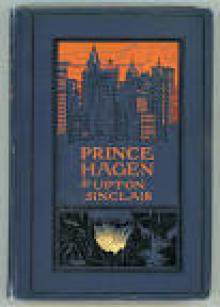 Prince Hagen
Prince Hagen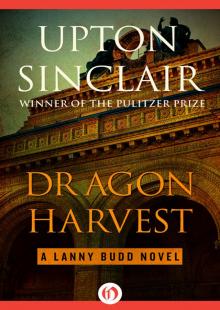 Dragon Harvest
Dragon Harvest The Jungle
The Jungle Sylvia's Marriage
Sylvia's Marriage Oil! A Novel by Upton Sinclair
Oil! A Novel by Upton Sinclair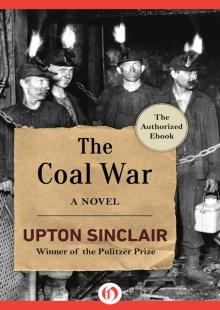 The Coal War: A Novel
The Coal War: A Novel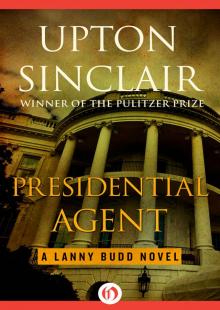 Presidential Agent
Presidential Agent World's End
World's End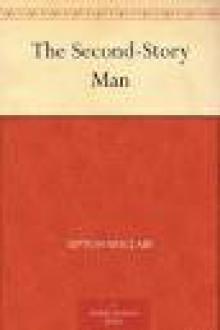 The Second-Story Man
The Second-Story Man O Shepherd, Speak!
O Shepherd, Speak! Wide Is the Gate
Wide Is the Gate The Return of Lanny Budd
The Return of Lanny Budd One Clear Call I
One Clear Call I 100%: the Story of a Patriot
100%: the Story of a Patriot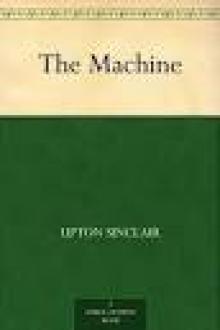 The Machine
The Machine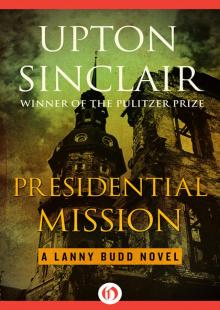 Presidential Mission
Presidential Mission A Cadet's Honor: Mark Mallory's Heroism
A Cadet's Honor: Mark Mallory's Heroism Between Two Worlds
Between Two Worlds World's End (The Lanny Budd Novels)
World's End (The Lanny Budd Novels) Between Two Worlds (The Lanny Budd Novels)
Between Two Worlds (The Lanny Budd Novels)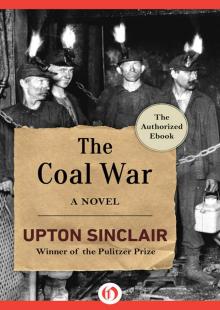 The Coal War
The Coal War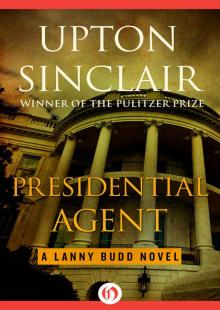 Presidential Agent (The Lanny Budd Novels)
Presidential Agent (The Lanny Budd Novels) Oil (filmed as There Will Be Blood)
Oil (filmed as There Will Be Blood) Wide Is the Gate (The Lanny Budd Novels)
Wide Is the Gate (The Lanny Budd Novels)